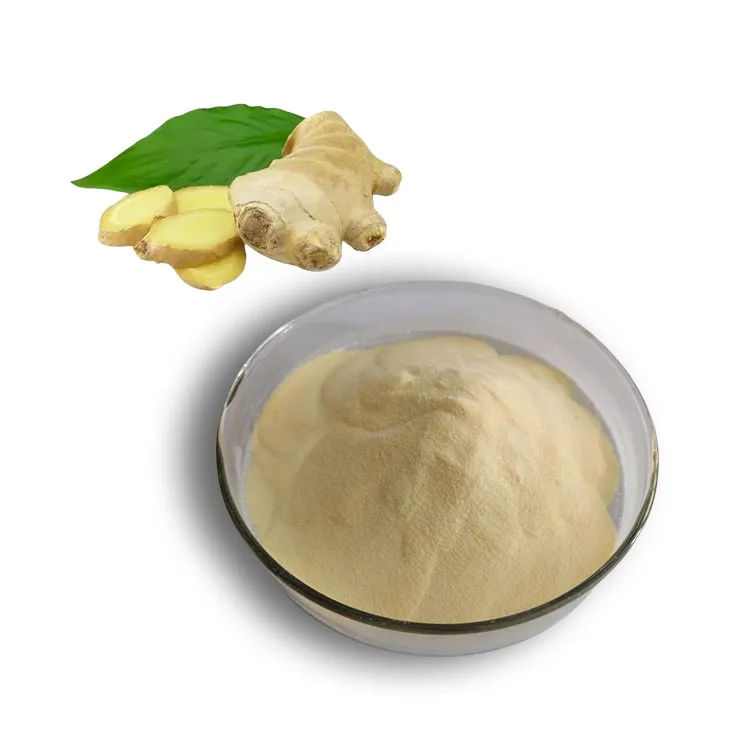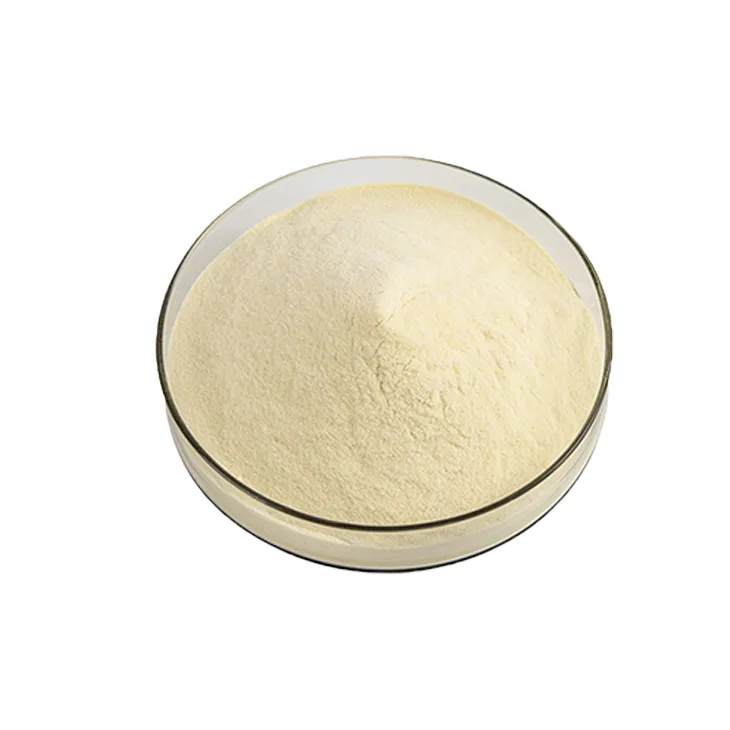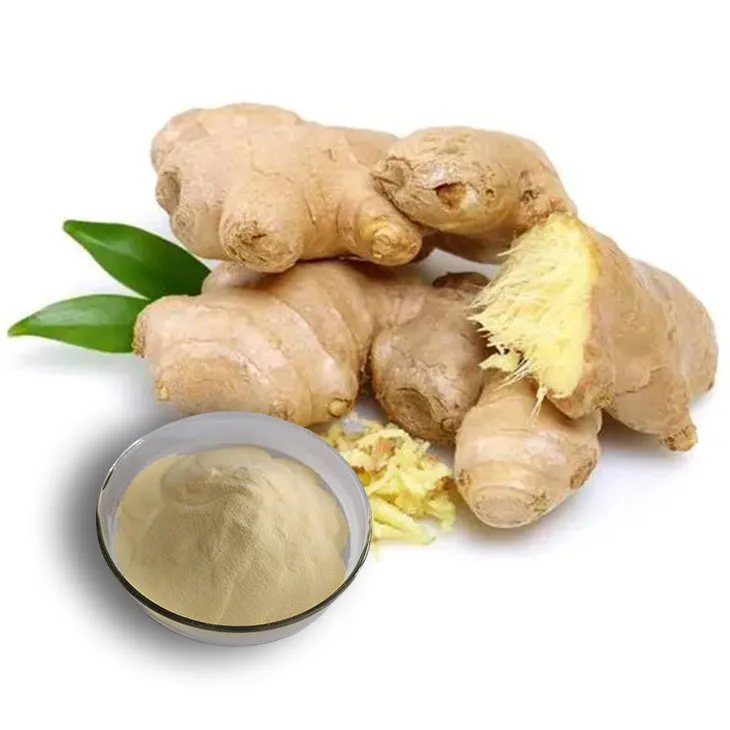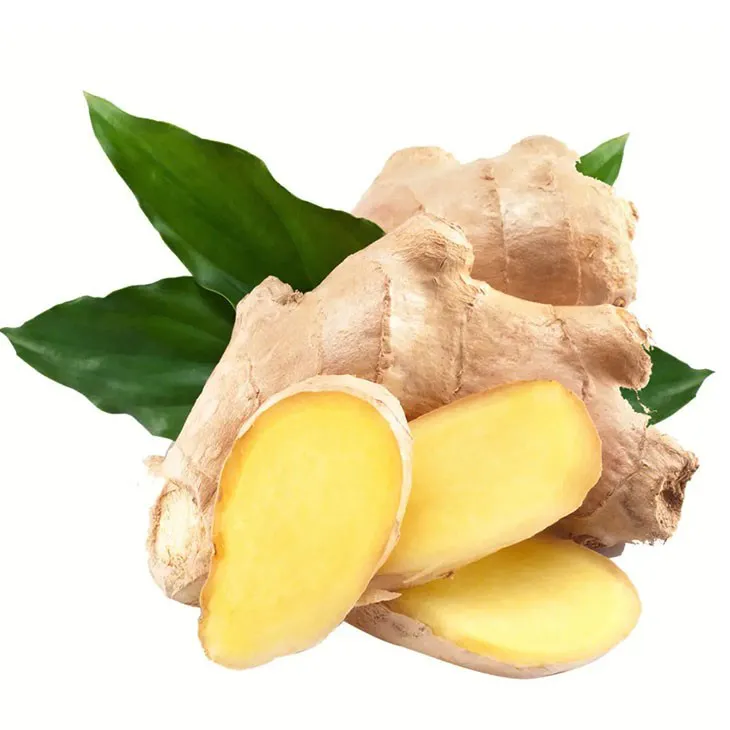- 0086-571-85302990
- sales@greenskybio.com
What is ginger extract and why is it used on the skin?
2024-11-12

1. Introduction to Ginger Extract
Ginger Extract is a substance derived from ginger, a well - known plant with a long history of use in various aspects, including culinary, medicinal, and now, in the realm of skin care. Ginger, scientifically known as Zingiber officinale, is native to Southeast Asia but is now cultivated and used all over the world. The extract is obtained through a process that typically involves crushing or grinding the ginger root and then using solvents or other extraction methods to isolate the active components.

2. Bioactive Compounds in Ginger Extract
Ginger extract is rich in a variety of bioactive compounds that contribute to its beneficial effects on the skin. Some of the key compounds include:
2.1 Gingerols
Gingerols are the primary bioactive components in ginger. They are responsible for many of ginger's characteristic properties, such as its pungent flavor and its antioxidant and anti - inflammatory effects. In skin care, gingerols can help protect the skin from damage caused by free radicals, which are unstable molecules that can lead to premature aging, wrinkles, and other skin problems.
2.2 Shogaols
Shogaols are formed when ginger is dried or cooked. They also possess antioxidant and anti - inflammatory properties. These compounds can enhance the skin's natural defense mechanisms and help soothe irritated skin.
2.3 Zingerone
Zingerone is another important compound in ginger extract. It has antioxidant and antimicrobial properties. In the context of skin care, it can help prevent the growth of harmful bacteria on the skin, which is crucial for maintaining healthy skin.

3. Antibacterial Properties and Acne Treatment
3.1 Antibacterial Nature One of the significant reasons ginger extract is used on the skin is its antibacterial nature. The skin is constantly exposed to various bacteria, some of which can cause acne and other skin infections. Ginger extract, with its bioactive compounds like gingerols and zingerone, can effectively combat acne - causing bacteria.
3.2 Acne Treatment Acne is a common skin condition that affects people of all ages. It occurs when hair follicles become clogged with oil and dead skin cells, providing an ideal environment for bacteria to thrive. Ginger extract helps in treating acne in multiple ways. Firstly, it kills the bacteria that contribute to the inflammation and formation of acne lesions. Secondly, its anti - inflammatory properties reduce the redness and swelling associated with acne, promoting faster healing of the skin.

4. Exfoliating Effects
4.1 Gentle Exfoliation Ginger extract is an excellent exfoliator. Exfoliation is the process of removing dead skin cells from the surface of the skin. Dead skin cells can make the skin look dull and rough. Ginger extract gently sloughs off these dead skin cells without being overly abrasive. This is because the bioactive compounds in ginger extract work to break down the bonds between dead skin cells, allowing them to be easily removed.
4.2 Fresher and Smoother Skin By removing dead skin cells, ginger extract helps to reveal the fresh, new skin cells underneath. This results in a skin that looks fresher and smoother. Regular exfoliation with ginger extract can also improve the overall texture of the skin, making it more even - toned and reducing the appearance of pores.

5. Warming Effect and Product Absorption
5.1 Warming Effect Ginger extract has a warming effect on the skin. This warming effect is due to the stimulation of blood circulation near the surface of the skin. When the skin is warmed, the blood vessels dilate, allowing for better nutrient and oxygen delivery to the skin cells. This increased blood flow also helps in removing waste products from the skin more efficiently.
5.2 Enhanced Product Absorption The warming effect of ginger extract can enhance the absorption of other skin care products. When used in combination with other products such as moisturizers, serums, or anti - aging creams, ginger extract can help these products penetrate deeper into the skin. This maximizes the efficacy of the overall skin care routine as more of the active ingredients in the other products can reach the deeper layers of the skin where they can have a more significant impact.
6. Anti - Inflammatory Benefits
6.1 Inflammation and Skin Health Inflammation is a natural response of the body to injury or infection. However, chronic inflammation can have a negative impact on skin health. It can lead to various skin conditions such as eczema, psoriasis, and premature aging. Ginger extract, with its anti - inflammatory properties, can help reduce chronic inflammation in the skin.
6.2 Soothing Irritated Skin For those with sensitive or irritated skin, ginger extract can be a soothing remedy. It can calm redness, itching, and discomfort associated with skin irritation. Whether the irritation is caused by environmental factors, such as exposure to harsh chemicals or the sun, or due to an underlying skin condition, ginger extract can provide relief.
7. Antioxidant Protection
7.1 Free Radicals and Skin Damage Free radicals are unstable molecules that are constantly generated in our bodies due to various factors such as exposure to UV radiation, pollution, and stress. These free radicals can cause damage to skin cells by oxidizing lipids, proteins, and DNA. This damage can lead to premature aging, wrinkles, and a loss of skin elasticity.
7.2 Antioxidant Defense Ginger extract, with its antioxidant compounds like gingerols, shogaols, and zingerone, can neutralize free radicals. By scavenging these harmful molecules, ginger extract helps protect the skin from oxidative damage. This antioxidant protection can keep the skin looking youthful and healthy for a longer period.
8. How to Use Ginger Extract on the Skin
8.1 Ginger Extract in Skin Care Products Ginger extract is commonly found in a variety of skin care products. These include facial cleansers, toners, moisturizers, and masks. When using products containing ginger extract, it is important to follow the instructions provided on the product label. For example, if using a ginger - extract facial cleanser, wet your face first, apply a small amount of the cleanser to your hands, and gently massage it onto your face in circular motions before rinsing with warm water.
8.2 DIY Ginger Extract Skin Treatments You can also create your own ginger extract skin treatments at home. Here are some simple DIY recipes:
- Ginger and Honey Mask - Mash a small piece of ginger to get a paste. - Add a tablespoon of honey to the ginger paste. - Apply the mixture to your face and leave it on for 10 - 15 minutes before rinsing with warm water. This mask can help moisturize and soothe the skin while also providing the benefits of ginger extract.
- Ginger Toner - Boil a few slices of ginger in water for about 10 minutes. - Let the water cool down and strain it into a clean bottle. - Use the ginger - infused water as a toner by applying it to your face with a cotton ball. This toner can help tighten pores and provide antioxidant protection.
9. Precautions and Considerations
9.1 Skin Sensitivity While ginger extract has many benefits for the skin, some people may be sensitive to it. Those with very sensitive skin may experience redness, itching, or irritation when using ginger extract - based products or treatments. It is advisable to do a patch test before using ginger extract on a large area of the skin. To do a patch test, apply a small amount of the product or treatment to a small area of skin, such as the inside of your wrist, and wait for 24 hours to see if any adverse reactions occur.
9.2 Allergic Reactions Although rare, allergic reactions to ginger extract are possible. If you experience symptoms such as swelling, difficulty breathing, or a rash after using ginger extract on your skin, discontinue use immediately and seek medical attention.
FAQ:
1. What are the main bioactive compounds in ginger extract?
Ginger extract contains various bioactive compounds such as gingerols, shogaols, and zingerone. These compounds contribute to its antibacterial, exfoliating, and other beneficial properties for the skin.
2. Can ginger extract be used on all skin types?
While ginger extract can offer benefits for many skin types, it may not be suitable for everyone. People with very sensitive skin may experience irritation as ginger has a warming effect. It is advisable to do a patch test first to check for any adverse reactions.
3. How often should ginger extract be applied to the skin?
The frequency of application depends on individual skin conditions. For normal skin, using ginger extract - based products two to three times a week might be sufficient. However, for those with acne - prone skin, it could be used more frequently, but not exceeding daily use, unless under the guidance of a dermatologist.
4. Are there any side effects of using ginger extract on the skin?
Some potential side effects may include skin irritation, redness, or a burning sensation, especially for those with sensitive skin. If any of these symptoms occur, the use of ginger extract on the skin should be discontinued immediately.
5. How does ginger extract help in treating acne?
As mentioned, ginger extract has antibacterial properties. It can target and kill the bacteria that are often responsible for causing acne. Additionally, its exfoliating action helps to unclog pores, which further aids in preventing and treating acne.
6. Can ginger extract lighten the skin?
There is no conclusive evidence that ginger extract can directly lighten the skin. However, by promoting the exfoliation of dead skin cells and improving the overall health of the skin, it may give the appearance of a more even - toned and brighter complexion.
Related literature
- The Effects of Ginger and its Bioactive Compounds on Skin Health"
- "Ginger Extract in Dermatological Applications: A Review"
- "Beneficial Roles of Ginger - Derived Compounds in Skin Care"
- ▶ Hesperidin
- ▶ Citrus Bioflavonoids
- ▶ Plant Extract
- ▶ lycopene
- ▶ Diosmin
- ▶ Grape seed extract
- ▶ Sea buckthorn Juice Powder
- ▶ Fruit Juice Powder
- ▶ Hops Extract
- ▶ Artichoke Extract
- ▶ Mushroom extract
- ▶ Astaxanthin
- ▶ Green Tea Extract
- ▶ Curcumin
- ▶ Horse Chestnut Extract
- ▶ Other Product
- ▶ Boswellia Serrata Extract
- ▶ Resveratrol
- ▶ Marigold Extract
- ▶ Grape Leaf Extract
- ▶ New Product
- ▶ Aminolevulinic acid
- ▶ Cranberry Extract
- ▶ Red Yeast Rice
- ▶ Red Wine Extract
-
Black Pepper Extract
2024-11-12
-
Shikonin
2024-11-12
-
Pomegranate Extract
2024-11-12
-
Okra Extract
2024-11-12
-
Avocado Extract Powder
2024-11-12
-
Pueraria Lobata Extract
2024-11-12
-
Berberis aristata Extract
2024-11-12
-
Oyster Mushroom Extract Powder
2024-11-12
-
Saponin Extract
2024-11-12
-
Horse Chestnut Extract
2024-11-12





















